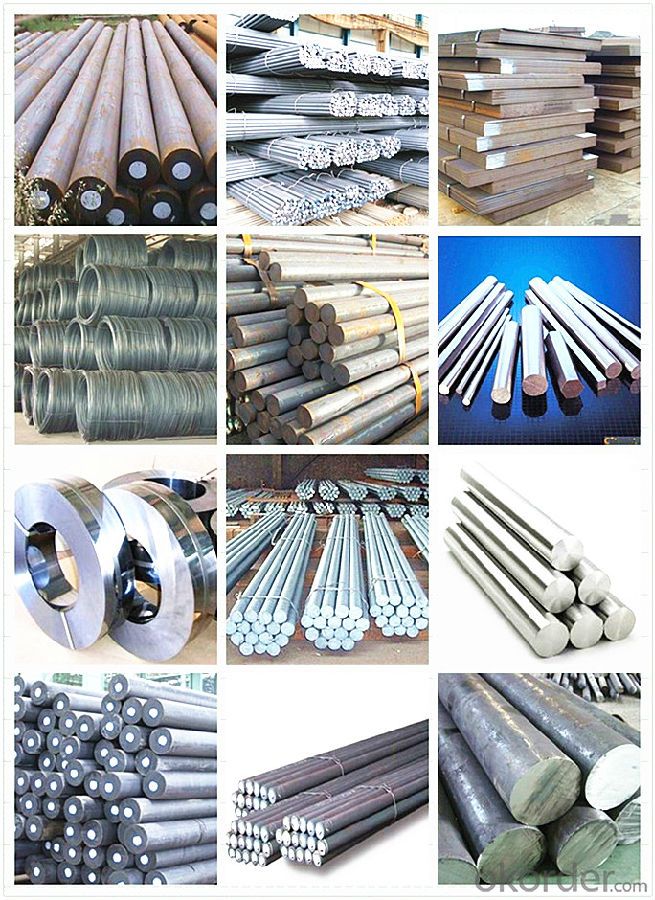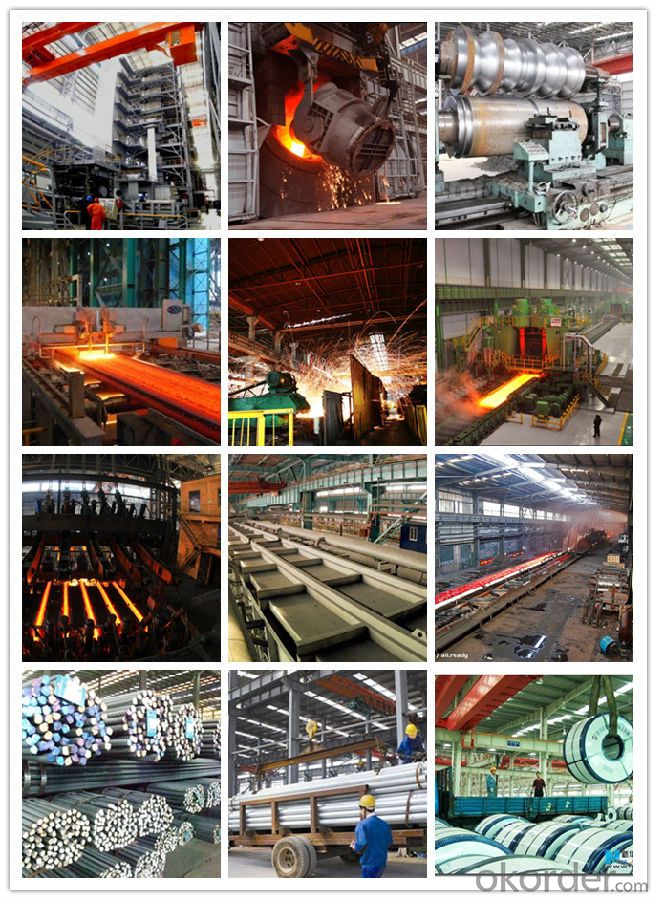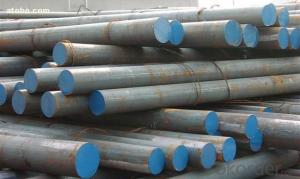Special Steel JIS SCr440 Alloy Steel Round Bars
- Loading Port:
- China main port
- Payment Terms:
- TT OR LC
- Min Order Qty:
- 20 m.t.
- Supply Capability:
- 10000 m.t./month
OKorder Service Pledge
OKorder Financial Service
You Might Also Like
Item specifice
Product information:
Standard | JIS G4053-2003 | ||||||||||
Grade | JIS SCr440 | ||||||||||
MOQ | 1 Metric Ton | ||||||||||
Diameter | 8mm~1500mm | ||||||||||
Length | 6m,12m or as required. | ||||||||||
Diameter Tolerance | As required | ||||||||||
Condition of delivery | Hot rolled,Cold Rolled or as required. | ||||||||||
Chemical Composition(%) | |||||||||||
C | Si | Mn | P | S | Cr | ||||||
0.37-0.44 | 0.17-0.37 | 0.50-0.80
| ≤0.035 | ≤0.035 | 0.80-1.10 | ||||||
Ni | Cu | ||||||||||
≤0.30 | ≤0.030 | ||||||||||
Mechanical Properties(In Quenching and Tempering) | |||||||||||
Tensile strength | Yield strength | Elongation | Reduction in Area | Impact | Hardness | ||||||
(σb/MPa) | (σs/MPa) | (δ5/%) | (ψ/%) | (J) | (HB) | ||||||
≥980 | ≥785 | ≥9 | ≥45 | ≥47
| ≤207 | ||||||
Product Show:

Workshop Show:

Shipping
1. FedEx/DHL/UPS/TNT for samples, Door-to-Door;
2. By Air or by Sea for batch goods, for FCL; Airport/ Port receiving;
3. Customers specifying freight forwarders or negotiable shipping methods!
Delivery Time: 3-7 days for samples; 5-25 days for batch goods.
Payment Terms
1.Payment: T/T, L/C, Western Union, MoneyGram,PayPal; 30% deposits; 70% balance before delivery.
2.MOQ: 1pcs
3.Warranty : 3 years
4.Package Informations: 1) EXPORT, In 20 feet (GW 25 ton) or 40 feet Container (GW 25 ton)
2)as customer's requirement
Why choose us?
(1) The leading exporter in China special steel industry.
(2) Large stocks for various sizes, fast delivery date.
(3) Good business relationship with China famous factories.
(4) More than 7 years steel exporting experience.
(5) Good after-sales service guarantee.
- Q:What are the specific requirements for special steel used in the railway wheel industry?
- The specific requirements for special steel used in the railway wheel industry include high strength, durability, and resistance to wear and fatigue. The steel must have excellent mechanical properties to withstand heavy loads and impact forces. It should also have good heat treatment characteristics to ensure proper hardness and toughness. Additionally, the steel must meet strict dimensional and geometrical specifications to ensure compatibility with the railway system.
- Q:How does special steel contribute to reducing product recalls?
- Special steel contributes to reducing product recalls by providing improved strength, durability, and resistance to wear and tear. By using special steel in manufacturing processes, products are less likely to experience structural failures, malfunctions, or breakages that could lead to safety hazards or performance issues. This ultimately enhances the overall quality and reliability of products, minimizing the chances of recalls due to material-related defects.
- Q:What is the process of manufacturing special steel?
- The process of manufacturing special steel involves several steps. Firstly, raw materials such as iron ore, coal, and limestone are gathered and processed to create molten iron in a blast furnace. Next, impurities like carbon, sulfur, and phosphorus are removed through various refining techniques. Once the desired composition is achieved, the molten iron is transferred to a steelmaking furnace, where alloying elements like chromium, nickel, or manganese are added to impart specific properties. The mixture is then refined further to remove any remaining impurities and to adjust the temperature and composition. After refining, the molten steel is cast into various shapes such as blooms, billets, or slabs, depending on the desired end product. These primary forms are then subjected to hot rolling, forging, or extrusion processes to shape them into the desired final products, such as bars, plates, or wires. Finally, the manufactured steel undergoes heat treatment processes like annealing, quenching, or tempering to enhance its strength, hardness, and other mechanical properties. It is also subjected to quality control measures to ensure it meets the required specifications. Overall, the process of manufacturing special steel involves a combination of raw material preparation, refining, casting, shaping, heat treating, and quality control steps to produce steel with specific properties tailored to meet diverse industrial needs.
- Q:How does special steel contribute to the marine industry?
- The marine industry greatly relies on special steel due to its exceptional strength, durability, and corrosion resistance, which are vital qualities for various marine applications. A significant role of special steel in the marine industry lies in the building of ships and submarines. These vessels face harsh environmental conditions, such as exposure to saltwater, extreme temperatures, and high pressures. Special steel, such as high-strength low-alloy (HSLA) steel or stainless steel, ensures the structural integrity of these vessels and improves their overall performance. The high strength-to-weight ratio of the steel allows for the creation of lighter yet sturdy hulls, enabling ships and submarines to navigate rough seas more effectively. In addition, special steel is extensively used in marine equipment and components. For instance, it is utilized in the manufacturing of propeller shafts, rudders, and other crucial parts that need to withstand the forces exerted by water. Stainless steel, with its corrosion-resistant properties, is ideal for various marine fittings like valves, fasteners, and pipes, guaranteeing longevity and efficient operation in highly corrosive marine environments. Furthermore, special steel finds applications in offshore structures such as oil rigs, platforms, and wind turbines. These structures must endure harsh conditions like strong ocean currents, heavy waves, and corrosive saltwater. Special steel grades like carbon-manganese steel or weathering steel are specifically designed to provide exceptional strength and corrosion resistance, making them suitable for offshore installations. Lastly, in the marine industry, special steel is indispensable for fabricating marine containers and cargo handling equipment. The steel's high tensile strength and impact resistance ensure the safe transportation of goods by sea, making sure that containers can withstand dynamic forces during shipping and protect the cargo from water intrusion. All in all, special steel's unique properties make it an essential material in the marine industry. Its strength, durability, and corrosion resistance significantly contribute to the construction of ships, submarines, offshore structures, marine equipment, and cargo containers, enabling safe and efficient maritime operations.
- Q:What is the impact of carburizing on the properties of special steel?
- Carburizing, also known as case hardening, is a heat treatment process that involves introducing carbon into the surface layer of special steel. This process has a significant impact on the properties of the steel, enhancing its hardness, wear resistance, and strength. One of the main effects of carburizing is the formation of a hard outer layer, known as the case, which is rich in carbon. The diffusion of carbon atoms into the steel matrix during carburizing increases the carbon content at the surface, resulting in a higher hardness compared to the core. This hardened case provides excellent resistance against wear, abrasion, and surface fatigue, making it well-suited for applications that require high durability, such as gears, camshafts, and bearings. Additionally, carburizing enhances the strength of the steel, as the increased carbon content improves the material's ability to form martensite, a hard, crystalline structure. This martensitic transformation further contributes to the hardness and strength of the carburized steel, making it suitable for applications that require high load-bearing capacity, such as shafts and axles. Furthermore, carburizing can improve the fatigue resistance of special steel. The hardened case formed during carburizing helps to distribute stress more evenly across the surface, reducing the likelihood of crack initiation and propagation. This increased resistance to fatigue failure makes carburized steel suitable for components subjected to cyclic loading, such as gears and springs. However, it is important to note that carburizing can also have some drawbacks. The increased carbon content at the surface can lead to reduced ductility and toughness, making the material more prone to brittle fracture. To mitigate this issue, it is common to use a lower carbon content steel for the core, ensuring a balance between hardness and toughness. In conclusion, carburizing has a significant impact on the properties of special steel. It enhances hardness, wear resistance, and strength, making it suitable for applications that require durability, high load-bearing capacity, and fatigue resistance. However, the process should be carefully controlled to maintain a balance between hardness and toughness, ensuring the material's overall performance and reliability.
- Q:How does special steel contribute to the defense aftermarket industry?
- Special steel plays a crucial role in the defense aftermarket industry by providing enhanced strength, durability, and resistance against extreme conditions. This allows for the manufacturing of high-performance components and equipment, such as armored vehicles, aircraft, and naval vessels. Special steel's unique properties enable the production of advanced weaponry and protective gear, ensuring the safety and effectiveness of defense operations. Additionally, its ability to withstand intense heat and pressure makes it ideal for critical applications like missile guidance systems and nuclear reactors. Overall, special steel is an essential material that drives innovation and strengthens the capabilities of the defense aftermarket industry.
- Q:How does special steel contribute to the packaging aftermarket industry?
- Special steel contributes to the packaging aftermarket industry by providing durable and high-quality materials for the manufacturing of packaging machinery and equipment. It enables the production of robust packaging solutions that can withstand the rigors of transportation and handling, ensuring the safe and secure delivery of goods. Additionally, special steel's corrosion resistance properties help in maintaining the integrity of packaging materials, prolonging their lifespan and reducing the need for frequent replacements.
- Q:How is special steel used in the production of gears?
- Special steel is commonly used in the production of gears due to its superior strength, durability, and resistance to wear and fatigue. The high-quality properties of special steel allow gears to withstand heavy loads, high speeds, and harsh operating conditions, ensuring reliable and efficient performance. Additionally, special steel can be heat treated to optimize its hardness and toughness, further enhancing gear performance and extending their lifespan.
- Q:Is special steel suitable for medical equipment manufacturing?
- Yes, special steel is suitable for medical equipment manufacturing. Special steel, also known as stainless steel, is commonly used in the production of medical equipment due to its unique properties. It is highly corrosion-resistant, which is crucial for maintaining the hygiene and cleanliness standards required in medical settings. Special steel also has excellent strength and durability, ensuring that the equipment can withstand frequent use and sterilization processes without compromising its quality. Additionally, special steel can be easily molded and shaped into various intricate designs, making it ideal for manufacturing complex medical instruments and devices. Overall, the use of special steel in medical equipment manufacturing ensures the production of reliable and long-lasting products that meet the stringent requirements of the healthcare industry.
- Q:How does special steel perform in high-temperature environments?
- Special steel performs exceptionally well in high-temperature environments. It has a high melting point, excellent resistance to heat and thermal shock, and can retain its strength and hardness even at elevated temperatures. This makes it highly suitable for applications such as aerospace, power generation, and automotive industries, where materials are exposed to extreme heat and require exceptional performance and durability.
1. Manufacturer Overview |
|
|---|---|
| Location | |
| Year Established | |
| Annual Output Value | |
| Main Markets | |
| Company Certifications | |
2. Manufacturer Certificates |
|
|---|---|
| a) Certification Name | |
| Range | |
| Reference | |
| Validity Period | |
3. Manufacturer Capability |
|
|---|---|
| a)Trade Capacity | |
| Nearest Port | |
| Export Percentage | |
| No.of Employees in Trade Department | |
| Language Spoken: | |
| b)Factory Information | |
| Factory Size: | |
| No. of Production Lines | |
| Contract Manufacturing | |
| Product Price Range | |
Send your message to us
Special Steel JIS SCr440 Alloy Steel Round Bars
- Loading Port:
- China main port
- Payment Terms:
- TT OR LC
- Min Order Qty:
- 20 m.t.
- Supply Capability:
- 10000 m.t./month
OKorder Service Pledge
OKorder Financial Service
Similar products
New products
Hot products
Related keywords






























